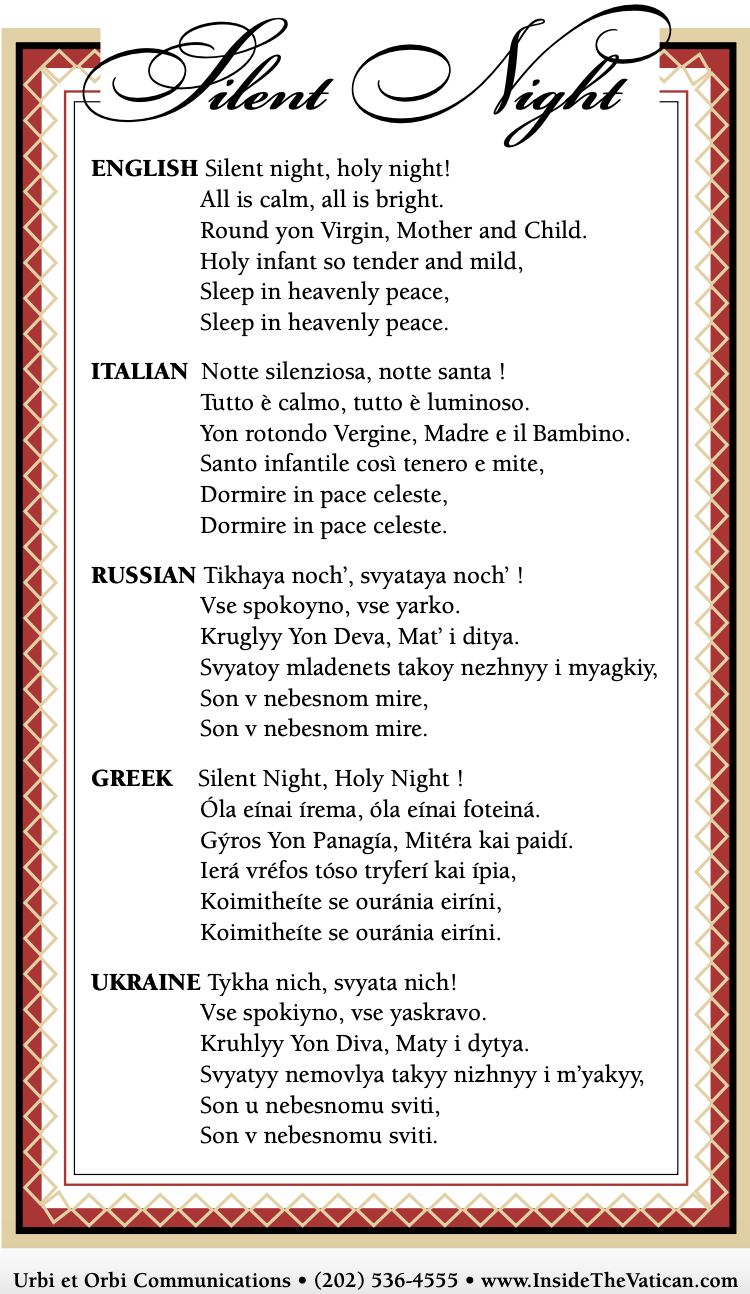
A sheet containing the first verse of the hymn Silent Night prepared for a Christmas dinner in Washington, D.C. in December 2014, more than nine years ago
Letter #183, 2023, Thursday, December 28: Memory of a Hymn
I received in my email today a link to the Christmas Homily delivered by Archbishop Carlo Maria Viganò, 82, in commemoration of the birth of Jesus Christ 2023 years ago in Bethlehem in Judea.
Despite the many polemics surrounding the archbishop on all sides of the Catholic spectrum (see, for example, link), this homily has nothing in it of Church polemics.
As is appropriate for Christmas, it focuses on the meaning of Christ’s Incarnation, and why that meaning gives supreme hope to mankind, always…
***
The homily’s title words are “For love has made you now become poor” — the final line of Italy’s most popular Christmas hymn: “Tu scendi dalle stelle” (“You descend from the stars,” written in 1732 in Nola, Italy, by St. Alphonsus Liguori.)
Here is a beautiful performance of the hymn by the blind Italian singer Andrea Bocelli (link).
He says it was the first Christmas hymn he ever learned, and his favorite. You may listen to him sing the hymn and follow it by reading the text below.
Tu scendi dalle stelle (English and Italian):
You come down from the stars, O King of heaven
Tu scendi dalle stelle, o Re del cielo
And come to a cave in the cold and frost
E vieni in una grotta al freddo e al gelo
And come to a cave in the cold and frost
E vieni in una grotta al freddo e al gelo
O my divine Child, I see you here trembling
O Bambino mio divino, io ti vedo qui a tremar
O blessed God
O Dio beato
Ah, how much it cost you to have loved us
Ah, quanto ti costò l’averci amato
Ah, how much it cost you to have loved us
Ah, quanto ti costò l’averci amato
To you, who are the Creator of the world
A te, che sei del mondo il Creatore
Clothes and fire are missing, oh my Lord
Mancano panni e fuoco, o mio Signore
Clothes and fire are missing, oh my Lord
Mancano panni e fuoco, o mio Signore
Dear chosen little child, how much this poverty
Caro eletto pargoletto quanto questa povertà
The more I fall in love
Più m’innamora
Since he made you poor love again
Giacché ti fece amor povero ancora
Since he made you poor love again
Giacché ti fece amor povero ancora
(The last line is the title of Viganò’s Christmas homily).
***
This reminded me of another Christmas hymn.
Just before Christmas in 2014, Viganò, then nuncio of the Holy See to the United States of America, kindly agreed to host a Christmas gathering for our Urbi et Orbi foundation. (link)
That evening, some 100 Catholic and Orthodox guests were present.
They came from Russia, Ukraine, Greece, Italy, Ireland, the Philippines, the United States, and other countries as well.
Guests included:
— a Russian, Leonid Sevastianov from Moscow, head of an alliance of Russian Orthodox Old Believers (link);
—a Ukrainian, Alexander Sigov from Kiev, son of leading Ukrainian Orthodox intellectual Dr. Constantin Sigov (link);
—my son, Christopher Hart-Moynihan, who had just traveled on the Trans-Siberian railroad with his brother, Luke, and come to Rome to meet Pope Francis. (The Pope kindly took time to meet the boys and talk to them in the Domus Santa Martha, where the four of us prayed together for 20 minutes in the chapel. Then he questioned them about their experience, which included playing guitars and singing songs with Russian soldiers, who got on and off the train as it rolled interminably through Asia toward Europe);
— an Orthodox American pastor of St. Andrew Orthodox Church in Riverside, California, Fr. Josiah Trenham (link);
— the Irish Bishop Brian Farrell, 79, a key official for many years in the Holy See’s Dicastery for the Unity of Christians, the Vatican’s office for dialogue with the Orthodox;
— his younger brother, Irish Cardinal Kevin Joseph Farrell, 76, formerly the Archbishop of Dallas, Texas, later head of the Dicastery for the Laity, Family and Life, now the Camerlengo of the Holy See, the man who will organize the next conclave.
We prepared a sheet of the first verse of Silent Night in five languages: English, Italian, Russian, Greek, and Ukrainian.
That evening, all together (though somewhat haltingly, reading from the sheets and helping one another), we 100 from many countries sang the first verse of Silent Night in five languages, recalling the coming into the world of the Prince of Peace, sharing together the hope, expressed in the hymn, that the little baby — and also all human babies — might “sleep in heavenly peace.” –RM
***
P.S. Here are two links I offer to you for your enjoyment and comment.
The first is to a number of brief videos I have done and posted on our Instagram pilgrimage website, two of which have (quite unexpectedly) gained more than 1 million views. (link)
The second is to a series of readings of the story of the 4th Wise Man read by my son, Christopher. The reading is done well and deserves a wider audience (link).
P.S.S. Any donation to support this letter is appreciated: here






Facebook Comments